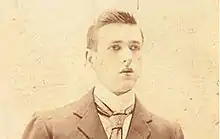Ernest Barker
Sir Ernest Barker FBA (23 September 1874 – 17 February 1960)[1] was an English political scientist who served as Principal of King's College London from 1920 to 1927.[2]
Ernest Barker | |
|---|---|
 Barker in the 1890s | |
| Born | 23 September 1874 |
| Died | 17 February 1960 (age 85) |
| Burial place | St Botolph's Church, Cambridge |
| Nationality | English |
| Alma mater | Balliol College, Oxford |
| Occupation | Principal of King's College London |
| Spouse(s) | Emily Isabel Salkeld (1900-1924), Olivia Stuart Horner (1927-1960) |
| Children | 5 |
Life and career
Born in Woodley, Cheshire; and educated at Manchester Grammar School and Balliol College, Oxford,[3] Barker was a Fellow of Merton College, Oxford from 1898 to 1905, St John's College, Oxford from 1909 to 1913, and New College, Oxford from 1913 to 1920.[4] He spent a brief time at the London School of Economics.[5] He was Principal of King's College London from 1920 to 1927,[6] and subsequently became Professor of Political Science in the University of Cambridge in 1928,[7] being the first holder of the chair endowed by the Rockefeller Foundation.[8]
In June 1936 he was elected to serve on the Liberal Party Council.[9] He was knighted in 1944. He was elected a Foreign Honorary Member of the American Academy of Arts and Sciences in 1958.[10]
Barker was married twice, firstly in 1900 to Emily Isabel Salkeld, with whom he had a son and two daughters; she died in 1924. In 1927 he married Olivia Stuart Horner; they had a son and a daughter.[4]
Barker died on 17 February 1960.[3][4] There is a memorial stone to him in St Botolph's Church, Cambridge.
Works
- The Political Thought of Plato and Aristotle (1906)
- The Republic of Plato (1906)
- Ernest Barker, H. W. Carless Davis, C. R. L. Fletcher, Arthur Hassall, L. G. Wickham Legg, F. Morgan, Why We Are at War: Great Britain's Case, by Members of the Oxford Faculty of Modern History (Oxford: Clarendon Press, 1914)
- Political Thought in England from Herbert Spencer to the present day: 1848-1914 (1915)
- Greek Political Theory: Plato and his Predecessors (1918)
- Ireland in the last Fifty Years: 1866-1918 (1919)
- Translator's Introduction (1934) to Otto von Gierke, Natural Law and the Theory of Society (1934)
- Oliver Cromwell and the English People (1937)
- Britain and the British People (1942)
- Reflections on Government (1942)
- "The Development of Public Services in Western Europe 1660-1930" 1944[11]
- The Politics of Aristotle (1946)
- Character of England edited (1947)
- Traditions of Civility (1948)
- Principles of Social and Political Theory (1951)
- Essays on Government[12] (1951)
- The European Inheritance edited with Sir George Clark and Professor P Vaucher (3 volumes, 1954)
- Age and Youth: Memories of Three Universities and the Father of Man (1953)
- Social Contract: Essays by Locke, Hume, and Rousseau (1956)
References
- "Barker, Sir Ernest (1874–1960), political theorist". Oxford Dictionary of National Biography. doi:10.1093/ref:odnb/9780198614128.001.0001/odnb-9780198614128-e-30588. Retrieved 2020-10-29.
- "barker, Ernest". Who's Who. ukwhoswho.com. 1920–2016 (April 2014 online ed.). A & C Black, an imprint of Bloomsbury Publishing plc. Retrieved 15 December 2017. (subscription or UK public library membership required)
- "Sir Ernest Barker" The Times (London, England), Friday, Feb 19, 1960; pg. 13; Issue 54699
- Levens, R.G.C., ed. (1964). Merton College Register 1900–1964. Oxford: Basil Blackwell. p. 4.
- "Sir Ernest Barker Prize Winners" (PDF). www.psa.ac.uk.
- "1938 Four by Sir Ernest Barker, Used - AbeBooks". www.abebooks.com. Retrieved 2020-10-29.
- "Britain and the British People. By Sir Ernest Barker. (London, New York, and Toronto: Oxford University Press. 1955. Pp. xii, 186. $2.00.)". American Political Science Review. 50 (2): 579–579. June 1956. doi:10.1017/S0003055400229997. ISSN 1537-5943.
- "1938 SIR ERNEST BARKER Four Page HANDWRITTEN LETTER by SIR ERNEST BARKER: (1938) 1st Edition, Inscribed by Author(s) Manuscript / Paper Collectible | Blank Verso Books". www.abebooks.com. Retrieved 2020-10-29.
- The Liberal Magazine, 1936
- "Book of Members, 1780-2010: Chapter B" (PDF). American Academy of Arts and Sciences. Retrieved 17 May 2011.
- In Europe in the Eighteenth Century 1713-1783 by M S Anderson
- Essays On Government by Ernest Barker
Further reading
- Author and Book Info.com
- Arthur Aughey (2007) The Politics of Englishness; Manchester University Press
- Andrezj Olechnowicz, 'Liberal anti-fascism in the 1930s: The case of Sir Ernest Barker', Albion 36, 2005, pp. 636–660
- Julia Stapleton (1994), Englishness and the Study of Politics: The Social and Political Thought of Ernest Barker
- Julia Stapleton (2007), Ernest Barker in Brack & Randall (eds.), The Dictionary of Liberal Thought, Politico's Publishing
- Julia Stapleton (editor) Polis, vol. 23:2 (2006), Ernest Barker: A Centenary Tribute
External links
![]() Works written by or about Ernest Barker at Wikisource
Works written by or about Ernest Barker at Wikisource
- Political Studies Association Hall of Fame
- "Archival material relating to Ernest Barker". UK National Archives.

| Academic offices | ||
|---|---|---|
| Preceded by Ronald Burrows |
Principal of King's College London 1920–1927 |
Succeeded by William Reginald Halliday |